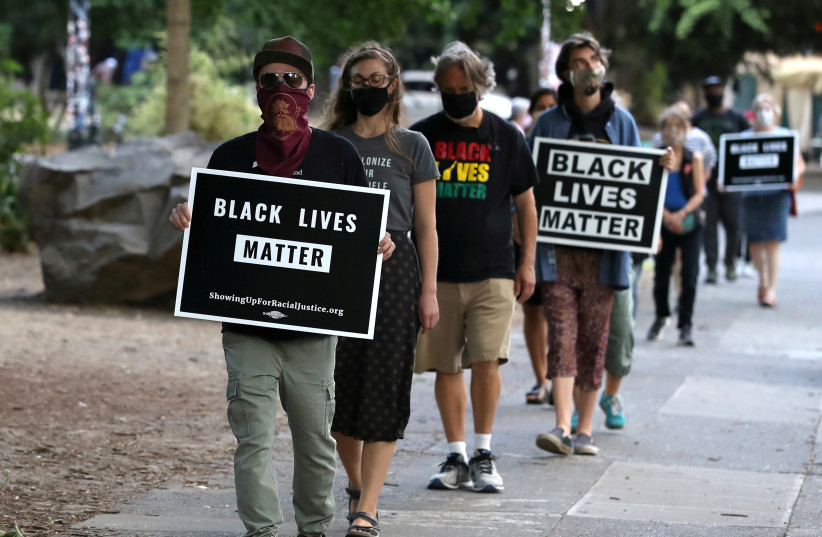The image is chilling in its overt and malevolent celebration of the brutal Hamas attack of last October 7, in which over 1,200 Israeli civilians died.
Released by the national office of Black Lives Matter (BLM) in Chicago and featured on X, with the slogan “I Stand With Palestine,” the meme portrays a Hamas fighter on a paraglider on his way to participate in the murderous mission of October 7.
Separately, The Movement for Black Lives, a coalition of more than 50 Black liberationist organizations – including BLM – released a statement condemning “the deadly, racist attacks against the Palestinian people by the Israeli state.”
Demanding a full cutoff of US military aid to Israel, the Movement for Black Lives also called on the Biden administration to impose sanctions until Israel “stops its apartheid practices and settler-colonial project.”
For a rabbi who has devoted close to 40 years to strengthening Black-Jewish relations in America, the bitterly antisemitic celebration by BLM of Hamas’s slaughter of Jews, including the unspeakable atrocities such as mass rapes, truly felt like a dagger to the heart.

An image of betrayal
The image of the Hamas fighter on the paraglider is an obscene betrayal of the shared dreams of freedom and equality that led thousands of Jews to become Freedom Riders during the civil rights era, enduring beatings by white, racist police officers in places like Selma and Birmingham, alongside their African-American brothers and sisters.
If things weren’t bleak enough, December brought the contretemps over Claudine Gay, the first Black and female president of Harvard University. Testifying to a congressional committee on December 5, Gay, together with the presidents of the University of Pennsylvania and MIT, gave legalistic and nuanced responses during Congressional testimony as to whether it is acceptable to advocate on their campuses for the genocide of Jews. What was most dismaying was the number of Black activists who rallied in support of Gay, despite her inability to condemn these antisemitic protests, attacks, and diatribes.
Monday, January 15, marks Dr. Martin Luther King, Jr. Day and honors his legacy as the great civil rights activist.
Having authored Shared Dreams: Martin Luther King Jr. and the Jewish Community, I can state unequivocally that Dr. King would never have used the word “context” in combating antisemitism. He had an abiding contempt for antisemitism and was color-blind on this issue. He publicly denounced purveyors of Jew-hatred, even when they came from within his own African-American community.
During the last years of his life, Dr. King confronted and called out growing antisemitic rhetoric from radical leaders such as Stokely Carmichael in groups like the Student Non-Violent Coordinating Committee, with which his own Southern Christian Leadership Council (SCLC) had previously closely collaborated.
While some Black leaders sought to downplay the Jewish contribution to the Civil Rights Movement, Dr. King understood that the alliance was vital to the success of the movement.
In 1965, he remarked, “How could there be antisemitism among Negroes when our Jewish friends have demonstrated their commitment to the principle of tolerance and brotherhood, not only in the form of sizable contributions but in many other tangible ways and often at great personal sacrifice.
“Need I remind anyone of the awful beating endured by Rabbi Arthur Lelyveld of Cleveland when he joined the civil rights workers...? And who can ever forget the sacrifice of two Jewish lives, Andrew Goodman and Michael Schwerner, in the swamps of Mississippi? It would be impossible to record the contribution that the Jewish people have made toward the Negro’s struggle for freedom – it has been so great.”
The challenge remains as to whether Black activists today will emulate Dr. King in unequivocally denouncing the rise of antisemitism in America and calling it out within their community.
The writer is president of the Foundation for Ethnic Understanding and author of Shared Dreams: Martin Luther King Jr. and the Jewish Community.
